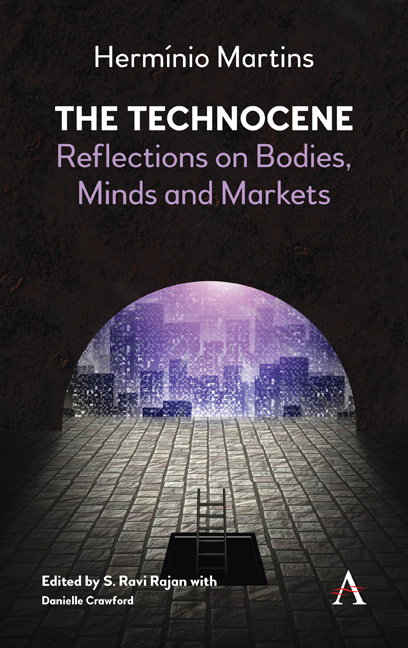Book contents
- Frontmatter
- Dedication
- Contents
- Preface
- Editor's Introduction: Hermínio Martins and the Technocene
- Chapter One The Technocene: On Bodies, Minds and Markets
- Chapter Two Technology Sublime: Paths to the Post-Human
- Chapter Three Perpetual Augmentation: From Eugenics to Human Genetic Capitalism
- Chapter Four The Body Vanishes! Momenta of Discarnation in Technoscience Today
- Chapter Five When Universities Become Body-Shops
- References
- Index
Editor's Introduction: Hermínio Martins and the Technocene
Published online by Cambridge University Press: 12 February 2019
- Frontmatter
- Dedication
- Contents
- Preface
- Editor's Introduction: Hermínio Martins and the Technocene
- Chapter One The Technocene: On Bodies, Minds and Markets
- Chapter Two Technology Sublime: Paths to the Post-Human
- Chapter Three Perpetual Augmentation: From Eugenics to Human Genetic Capitalism
- Chapter Four The Body Vanishes! Momenta of Discarnation in Technoscience Today
- Chapter Five When Universities Become Body-Shops
- References
- Index
Summary
Herminio Martins was born in Lourenco Marques (now Maputo) in Mozambique in 1934. He was a second-generation Mozambican, in that both his parents were born there as well. Herminio attended the Liceu Nacional in Maputo, which was then a small city of about 20,000, with blacks, Chinese, Indians, Italians and Germans in a multiracial pot. For a small city, it had a lively intellectual life, with several visiting scientists and artists from around the world giving lectures and concerts. Martins grew up in a household with books. His aunt and uncle, with whom he lived after the passing of his mother, were voracious readers and imported books in Portuguese from Portugal and Brazil, in French from the Continent and in English from a bookshop in Johannesburg, South Africa.
When Herminio completed secondary school, his family hoped he would attend college somewhere nearby. Geography dictated South Africa, but the young 17-year-old disapproved of the aparthied system there and decided to travel to England, where he knew nobody. He subsequently studied at the London School of Economics (LSE) where, in 1957, he earned a BSc (Econ.), an interdisciplinary degree akin to Oxford's PPE, before doing graduate research under the supervision of Ernest Gellner during 1957 to 1959. Amongst the many highlights of his career at LSE were classes in the philosophy of science with Karl Popper and a deep friendship with Imre Lakatos who apparently claimed that Martins was ‘the only sane sociologist he knew!’ Martins's time at LSE were the golden years of the discipline of philosophy of science, and these influences were to prompt him to write a classic essay on Thomas Kuhn (Martins 1972).
Martins's first job was at the University of Leeds, where he worked from 1959 to 1964. He taught in the social studies department, with colleagues from the disciplines of sociology, anthropology and political science and, worked, amongst others, with John Rex and Bryan Wilson. Martins recalls several seminars that influenced him while at Leeds. These included what became Piyo Rattansi and James E. McGuire's classic paper on Newton (Rattansi and McGuire 2007) and lectures given by the effervescent genius, Jerome Ravetz. Martins then moved to the University of Essex (1964– 71), where he cofounded the Department of Sociology and the School of Comparative Studies.
- Type
- Chapter
- Information
- The TechnoceneThe Technocene Reflections on Bodies, Minds and Markets, pp. xi - xviiiPublisher: Anthem PressPrint publication year: 2018



